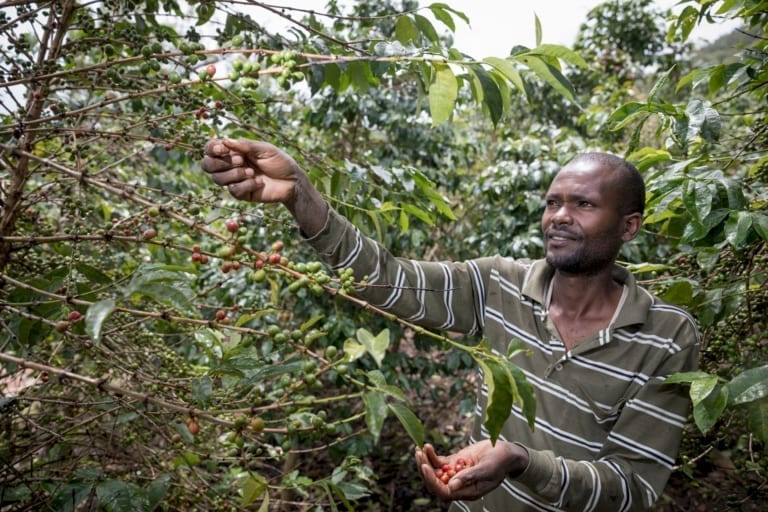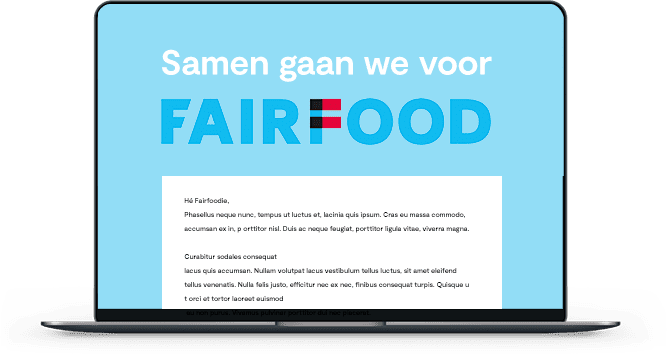Foodpact 1: new year’s food resolutions
At Fairfood, we love good food. We’d also like the people who produced our food to be able to afford a proper meal. Doesn’t sound like a very big deal, right? Yet it seems to be. In this new blog series, we’re investigating why and, more importantly: how we can solve this. This time: new year’s food resolutions.
What is your new year’s food resolution? There’s still time, it’s only January. Like all resolutions: think big but start small. If you were to tell me that just now you are buying your first pair of running shoes and at the same time signed up for the New York marathon, I would tell you: please don’t. It’s the same for food resolutions.
This week, when in line at the supermarket, take a good hard look at what’s in your basket (instead of looking at the contents of the basket of the person in front of you, like I always like to do). Which item could you replace for their fair counterpart? Rice, pineapple, coffee – take your pick. But start with just one.
Positive impact
With your purchase, you can make a positive impact on the livelihoods of the people producing our food. And, on a side note, you’d best keep those people happy, because by 2050 there’s 10 billions of us, that all need to be fed. How will we do that, in a sustainable and fair manner? Journalists, scientists and experts have tried formulating an answer to that question in the project called De Voedselzaak (the Food Case) for Dutch newspaper De Volkskrant. A selection of the best articles, you can find in this (Dutch, sorry!) e-book.
You shouldn’t trust coffee cheaper than ten euro’s
– Pieter Hotse Smit
Of all those articles, one really stuck with me: the story of coffee farmer Joël Twaginuonukigo in Rwanda. Not only because of course at Fairfood we had our coffee campaign last year, but mostly because Joël offers us an insight into his daily practices as a coffee entrepreneur and his (hard) efforts of securing his family with a future. The solar lamp that he has been saving up for for two years serves as a symbol for his constant battle. From now on, his kids can also work on their homework at night.
Food issues cover issues from climate change to population growth, famine and conflict. Hearing that, you may just feel discouraged before even starting to think of a solution. Farmer Joël’s story shows us that ultimately, ‘food’ is about human lives, about living a life in dignity, and maybe even about a solar lamp.

Consumer behavior
Reporter Pieter Hotse Smit followed Joël’s coffee from Rwanda to the Netherlands, and came to a conclusion: we are all paying too little for our coffee. “You shouldn’t trust coffee cheaper than ten euros”, he concluded this week, during the event to wrap up De Voedselzaak. “It’s irresponsible to be playing with the prices of coffee.”
His colleague, Carlijne Vos, mastermind behind De Voedselzaak, dove deep into the matter for a whole year, and concluded that ultimately the solution is in consumer behavior: “We should be paying more for our food. Right now, the people producing our food are losing money by us consuming it, instead of earning it.”
Food resolutions
‘Consumer behavior’ sounds pretty big, elusive, and hard to comprehend. Talking about it, soon you’ll lose yourself in discussions about what exactly is going on in the head of ‘the consumer’ and how to educate ‘the consumer’. As if we are talking about some alienated army that is playing power games with our supermarkets. But actually we’re just talking about you and me. And let’s just be straight with ourselves: we can all think of at least one product we can trade for their fair counterpart. Call it a food resolution.
“I’m all for consumer responsibility”, food journalist Mac van Dinther responded during that same evening. “I want to contribute, but I can’t seem to find the fair products. Entrepreneurs, help me out!”
We can all think of at least one product we can trade for their fair counterpart.
A call to food makers
Of course, the trained eye will notice the certification labels, but it’s true, it’s discounters that dominate your view in the supermarket. Don’t expect to find good stories there. “We don’t want to scream from the rooftops just how good we are”, I sometimes hear the people behind our food brands say, “as long as we know that we are doing the right thing.” False modesty, if you ask me, but, more importantly, modesty that just isn’t too convenient. Because you are discouraging people like Mac, myself and ‘the consumer’ from carrying out our food resolutions.
Therefore, my call to all food makers this year: help us keep our resolutions. Be honest, be transparent, about what it is you do to help the people at the beginning of our food chains build a future. Who knows, your product just might end up in our shopping basket (and the one in front of us).
Photo above this blog: Craig Sillitoe, Flickr
